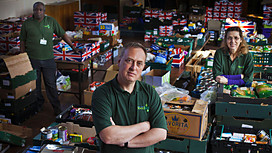Recent tabloid headlines about how much food is thrown away provided a timely backdrop to a meeting held last Wednesday at City Hall by Plan Zheroes. In attendance were charities, soup kitchen, faith groups, donors (including Paul UK, Pret a Manger, ‘Corporate Catering’) and logistics organisations (including FareShare and Best Before) all keen to make use of surplus food to ensure as much as possible goes to those who could use it and not to landfill or as a component in the production of energy.
We were there to discuss the technological requirements for a new application that will radically improve communications between surplus food donors and recipients which is in development by an expert team from Ricardo-AEA, supported by WRAP. I was there on behalf of those organisations who’ve committed to being part of the Plan Zheroes movement in Sussex.
It was such a cosmoplolitan gathering with significant Gallic representation I thought I’d share a factional story from South West France to illustrate how technology can enhance the logistics chain for even the smallest of donations.
un petite Restos du Cœur?
In a small rural community near Toulouse its nearly closing time at the local supermarche. Mme St Arroman gets the sms message she’s been waiting for from the manager: today’s surplus food is 7 pains, 3 poulet rotis, a selection of legumes, some packed boeuf and 5 jambon fromage pizzas.
Enough she thinks to meet the requirements of the local sanctuary for the homeless who have grown in number since the austerity measures have started to bite. At least they’ll get a good meal tonight!
She makes her by now regular call to Yvette one of the dozen or so volunteers who collect the food and deliver it to the sanctuary and the other self help groups and charities supplied by those local food stores and restaurants who’ve agreed to donate surplus food.
While Yvette is enroute Mme St Arroman has been receiving messages requesting deliveries. She never imagined when she and a group of local women started this initiative a few years back that it would have taken off in this way and now she has the difficult decision of apportioning the food that has been gifted.
Early on they signed up many charities and faith groups keen to have supplies to augment other food donations. It worked well to start and the charities collected the food directly; then as they failed to show up the surpermarche and the bistro cafe (who’d also been a supplier) had staff waiting after hours facing a disposal problem. Mme St Arroman and her team solved this by engaging with the local community and finding a number of volunteers willing to do the transportation. The locale municipality did its bit too gifting storage equipment such as a refrigerated van so the food was not degraded in transit.
They learned a great deal about human nature: one of the core prinicples of the using surplus food programme; that all gifted food must not be used for profitable activities was being flouted on a regular basis. The offenders were removed from the programme. Another principle, that wherever possible all donations would be applied to charities and groups that aspired to get people back on their feet and not become dependent is being carefully monitored and progress being made.
On a wider scale in France the national Restos du Cœur movement comprises more than 40,000 of all backgrounds with one point in common: generosity devoid of political or religious points of view. Their actions are based on the Volunteers’ Charter, whose 6 guiding points guarantee the good working order of the organisation.
The Restaurants du Cœur (literally Restaurants of the Heart but meaning Restaurants of Love), commonly and familiarly known as the Restos du Cœur, is a French charity, the main activity of which is to distribute food packages and hot meals to the needy. It was founded by the comedian Coluche in 1985.
‘fog in the Channel, Europe cut off’
Back in blighty with the chattering classes debating the sanity of Prime Minister Cameron’s EU referendum speech it became clear to the assembled gathering that the ability to provide real time alerts (similar to the French ‘story’) is a critical requirement for the new application. The core functionality included:
- measurement of the social and environmental impact
- a mechanism for rating
- a way of active virtual engagement and
- alerts
Back in the summer the then Environment Minister Caroline Spelman convened a summit in London of interested parties in the food retailing and distribution chains aimed at creating among other things a food-share database. The event was duly recorded in The Daily Mail with the charities are supporting the introduction of a so-called Good Samaritan law which exists in the US, to ensure firms that donate food in good faith are exempt from legal action arising from any adverse consequences.
Contrary to popular opinion, supermarkets do NOT throw away decent food unless they have a bad store manager- why would a business want to damage their profit margins?- it’s rotten food being left ON SALE that’s the biggest problem!!
plus ca change plus c’est la meme chose
While last July’s developments seemed promising at the time its difficult to discern real action and for some reason I cannot shake off an image of the ‘clunking fist’ that is governmental bureaucracy preventing action. Yet back across the channel I discover French Law actually prohibits the donation of food to its employees on taxable benefit grounds which you would have thought plays into the hands of surplus food donations to charity.
and finally
Wednesday’s meeting revealed a host of people passionate about making a difference: Church groups who need another tea urn but who have an ingenious and simple measurement device to see how many people they are serving (count the cups!); mobile soup kitchens whose volunteers don’t have cars and who would love to do more if only they knew where demand is not being met; and food donors who hate any waste and will provide food that meets dietary and religious sensitivities.
What struck me is the level of commitment and ingenuity. The Plan Zheroes and Ricardo-AEA team who are going to be creating the application have a tough challenge ahead to match the aspirations of those who assembled at City Hall.
And in case you are wondering ‘…if we want to give our customers choice we will produce surplus food’ is a direct but unattributable quote from one of the delegates in response to a question as to why surplus food production occurs in the first place. The ‘fog in the Channel: Europe cut off’, is a play on the headline ‘fog in the Channel: continent cut off’ that appeared in the Dally Mirror in 1930.

Scoping recipient requirements


